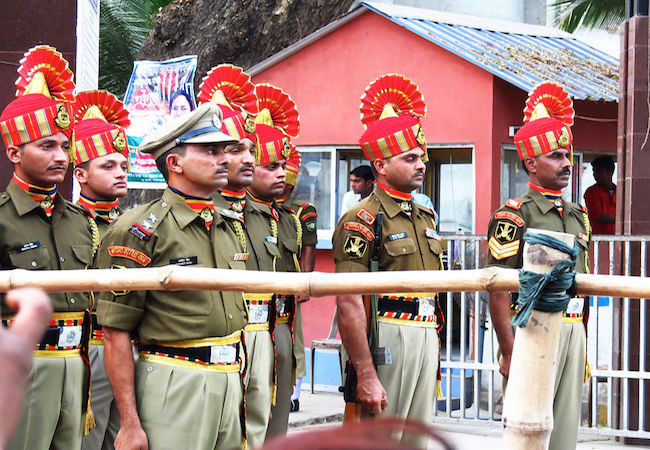
By Dr. Syed Shahid Hussain Bukhari
It is a very well known fact that Pakistan and India have been at odds with each other for the last 70 years in the history of sub-continent. Both states have fought wars and faced various near-war crises. Characterized as the ‘most dangerous place on earth’ by the Ex-President of United States, Bill Clinton, the South Asian region is yet awaiting the required development as deserved. People of the sub-continent have constantly been paying for their security but have never been able to ensure it rather have been entangled in Security Dilemma. Several attempts have been made to bring peace in the region but none has come to fruition. Although both states have extremely divergent claims that seem not to be adjustable too easily, efforts have yet been continued from intra-state activists as well as from international community while both the states’ governments have been using bilateral diplomatic channels to settle their disputes. The only good thing practiced in the past, was the continuation of dialogue process when started. This practice has now gone obsolete in the bilateral relationship and most of the efforts for negotiations have been relinquished due to India’s policy to halt negotiations with Pakistan if and when anything happens against their will.
Negotiations are known as the best tool for settlement of disputes between the states. One can observe that even the deadliest conflicts/wars are usually ended through negotiations. Keeping this in view, if one tries to examine the prospects for India-Pakistan dispute settlement, it is observable that India has always refrained from negotiating with Pakistan on the pretext of so-called acts of terrorism in India. Indian policy to suspend bilateral dialogues with Pakistan, without producing a solid proof regarding Pakistan’s involvement in acts of terrorism at Indian soil, is the product of increasing extremism in Indian policy circles regarding Pakistan. While India has always been talking about nurturing of extremism in Pakistan and have been pointing finger at non-state actors in Pakistan, it has never taken care of its own blatant state-policies that are greater manifestation of state-extremism. Promoting anti-Pakistan sentiments in Indian public has become a state policy, which is very alarming for peaceful settlement of outstanding disputes between the two countries. It is observable that anti-Pakistan sentiments have been enshrined in the hearts and minds of Indian public, media, and political parties. Pakistan-bashing has become a tool for Indian electronic media to attract the audience while Indian Political Parties use anti-Pakistan manifestos for their electoral campaigns.
The cancellation of Student’s tour in India due to the pressure of Indian extremists, stone-pelting training of Hindu groups to respond against the Kashmiri stone-pelters, and threats to Pakistani celebrities regarding performances in India, manifests Indian State’s inability or unwillingness to control such attitudes. An advice to kidnap Pakistani soldier, by the Former Indian Foreign Secretary Kanwal Sibal, for the purpose of bargaining in the Kulbhushan Jadhav case provides food for thought that how Indian policy-makers have been radicalized against Pakistan where they are unable to even understand their international obligations as well as rule of law. Most recent commendation reward by the Indian Army Chief, Bipin Rawat, to an Indian Major who tied a Kashmiri guy in front of his military jeep for the purpose of punishment, is another manifestation of extremism in State’s policy-making circles. It seems that anti-Pakistan sentiments are being deliberately supported as a state policy. Although Indian policymakers have been aiming at isolating Pakistan, it is foreseeable that projecting such kind of extremist attitude in one’s own public would contribute to self-alienation.
Since the neighbors cannot be changed, it would be wise to develop cordial relations with the people at your door-step rather than radicalizing your own public in hatred and violence. Indian policymakers must recognize the reality of Pakistan as a prudent state who cannot be undermined through acquisition of weapons or coercive diplomacy. Promoting so much hatred can neither defeat Pakistan nor boost Indian development. Such kind of extremism towards Pakistan will prove to be self-defeating for India in its surge for great power status. Moreover, so many hue and cries against Pakistan may also question the efficacy of Indian establishment to defend their state against the so-claimed Pakistan-sponsored acts of terrorism in India.
History has proved that despite having better resources available, Indians have never been successful in subordinating Pakistan and after the nuclearization of South Asia, such efforts will prove to be self-destructive. This is an era of economic cooperation and development for Asian nations where mutual cooperation will be a better choice. Pakistan has manifested its positive attitude by inviting India to be part of China Pakistan Economic Corridor (CPEC) which shall prove to be a road to prosperity in the region. Therefore, it will be a wise choice for Indian policy makers to adopt a policy of ‘Act North-West’ and open ways for engagement with Pakistan rather than estrangement.
Dr. Syed Shahid Hussain Bukhari is an Assistant Professor at the Department of Political Science, Bahauddin Zakariya University, Multan. He is also a Visiting Research Fellow with the Strategic Vision Institute, A Think-Tank based in Islamabad.




